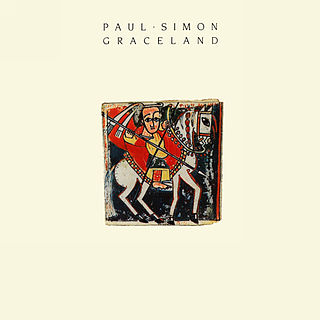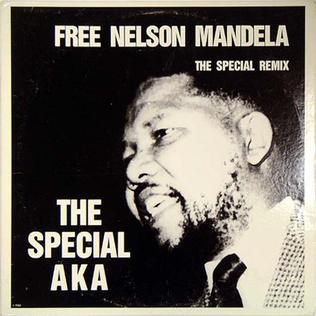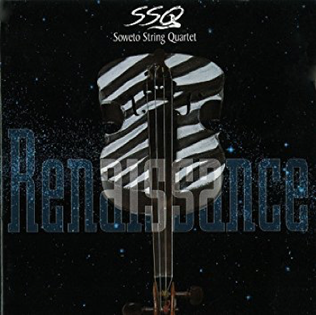
Men at Work are an Australian rock band formed in Melbourne in 1978 and best known for breakthrough hits such as "Down Under", "Who Can It Be Now?", "Be Good Johnny", "Overkill", and "It's a Mistake". Its founding member and frontman is Colin Hay, who performs on lead vocals and guitar. After playing as an acoustic duo with Ron Strykert during 1978–1979, Hay formed the group with Strykert playing bass guitar and Jerry Speiser on drums. They were soon joined by Greg Ham on flute, saxophone and keyboards, and John Rees on bass guitar, with Strykert switching back to lead guitar. The group was managed by Russell Depeller, a friend of Hay, whom he met at La Trobe University. This line-up achieved national and international success during the early to mid-1980s.

Graceland is the seventh solo studio album by the American singer-songwriter Paul Simon. It was produced by Simon, engineered by Roy Halee and released on August 25, 1986, by Warner Bros. Records. It incorporates genres including pop, rock, a cappella, and zydeco, and South African styles such as isicathamiya and mbaqanga.
The Cruel Sea are an Australian indie rock band from Sydney, New South Wales formed in late 1987. Originally an instrumental-only band, they became more popular when fronted by vocalist Tex Perkins in addition to Jim Elliott on drums, Ken Gormly on bass guitar, Dan Rumour on guitar and James Cruickshank on guitar and keyboards. Their albums include The Honeymoon Is Over (1993), Three Legged Dog (1995) and Over Easy (1998). Some of their best-known songs are "Better Get a Lawyer", "Takin' All Day", "The Honeymoon Is Over" and "Reckless Eyeballin'" – an instrumental track from their debut album Down Below that became the theme of Australian TV police drama, Blue Heelers. The band has won eight ARIA Music Awards including five in 1994 for work associated with The Honeymoon Is Over.

Drive-By Truckers are an American rock band based in Athens, Georgia. Two of five current members are originally from The Shoals region of northern Alabama and met as roommates at the University of North Alabama. The group also has roots in Richmond, Virginia.

B-Sides & Rarities is a 3CD compilation by Nick Cave and the Bad Seeds, released in March 2005. It features over 20 years of the band's B-sides and previously unreleased tracks. It is also the first recording to include all members of the Bad Seeds, past and present up to the time of its release: current members Mick Harvey, Blixa Bargeld, Thomas Wydler, Martyn P. Casey, Conway Savage, Jim Sclavunos, and Warren Ellis, and former members Barry Adamson, Hugo Race, Kid Congo Powers, Roland Wolf, and James Johnston. A second volume, B-Sides & Rarities Part II, was released in October 2021.
Mango Groove is an 11-piece South African Afropop band whose music fuses pop and township music—especially marabi and kwela.

Freshlyground was a band formed in Cape Town, South Africa in 2002. Freshlyground are best known for their collaboration on the afrofusion and soca single "Waka Waka " alongside Colombian singer Shakira, which received worldwide recognition. The music video featuring the group garnered over 3 billion views on YouTube, which led it to become one of the most-viewed videos on the platform.
Juluka was a South African band formed by Johnny Clegg and Sipho Mchunu. Juluka means "sweat" in Zulu, and was the name of a bull owned by Mchunu. The band was closely associated with the mass movement against apartheid.

Savuka, occasionally referred to as Johnny Clegg & Savuka, was a multi-racial South African band formed in 1986 by Johnny Clegg after the disbanding of Juluka. Savuka's music blended traditional Zulu musical influences with Celtic music and rock music that had a cross-racial appeal in South Africa. Their lyrics were often bilingual in English and Zulu and they wrote several politically charged songs, particularly related to apartheid. Some better-known Savuka songs include "Asimbonanga", and "Third World Child", from their 1987 album Third World Child. Band percussionist Dudu Zulu was killed in 1992; their song "The Crossing" was a tribute to him.

Alan Parsons is an English audio engineer, songwriter, musician and record producer.

Awake is the third studio album by American singer-songwriter Josh Groban. Announced on September 13, 2006, it is his third studio album, and a follow-up to his multi-platinum album Closer. Awake was released on November 7, 2006.

"Nelson Mandela" is a song written by British musician Jerry Dammers, and performed by the band the Special A.K.A. with a lead vocal by Stan Campbell. It was first released on the single "Nelson Mandela"/"Break Down the Door" in 1984.

The Works Tour was the tenth headlining concert tour by the British rock band Queen to promote their successful 1984 album The Works. During the tour, Queen participated in the Rock in Rio festival in 1985; the concert was released on VHS. The band released a DVD from a concert in Tokyo titled We Are the Champions: Final Live in Japan, but the name of the concert was incorrect as the band performed 2 further concerts after Tokyo in Nagoya and Osaka.
"Weeping" is an anti-apartheid protest song written by Dan Heymann in the mid-1980s, and first recorded by Heymann and the South African group Bright Blue in 1987. The song was a pointed response to the 1985 State of Emergency declared by President P.W. Botha, which resulted in "large-scale killings of unarmed and peaceful demonstrators against racial discrimination and segregation in South Africa." Defiantly, the song incorporated part of the melody to Nkosi Sikelel' iAfrika, the anthem of the anti-apartheid African National Congress. "Nkosi Sikelel' iAfrika" was banned at the time, and inclusion of even the melody violated the law. Today, "Nkosi Sikelel' iAfrika" is part of the national anthem of South Africa. The formerly illegal lyrics—"Nkosi sikelela, thina lusapho lwayo"—are now often sung when "Weeping" is recorded or performed.
"Soweto Blues" is a protest song written by Hugh Masekela and performed by Miriam Makeba. The song is about the Soweto uprising that occurred in 1976, following the decision by the apartheid government of South Africa to make Afrikaans a medium of instruction at school. The uprising was forcefully put down by the police, leading to the death of between 176 and 700 people. The song was released in 1977 as part of Masekela's album You Told Your Mama Not to Worry. The song became a staple at Makeba's live concerts, and is considered a notable example of music in the movement against apartheid.

The apartheid regime in South Africa began in 1948 and lasted until 1994. It involved a system of institutionalized racial segregation and white supremacy, and placed all political power in the hands of a white minority. Opposition to apartheid manifested in a variety of ways, including boycotts, non-violent protests, and armed resistance. Music played a large role in the movement against apartheid within South Africa, as well as in international opposition to apartheid. The impacts of songs opposing apartheid included raising awareness, generating support for the movement against apartheid, building unity within this movement, and "presenting an alternative vision of culture in a future democratic South Africa."

"Asimbonanga", also known as "Asimbonanga (Mandela)", is an anti-apartheid song by the South African racially integrated band Savuka. It was first released as a 12" single in 1986, and then included in their 1987 album Third World Child. It alluded to Nelson Mandela, imprisoned on Robben Island at the time of song's release, and other anti-apartheid activists. "Asimbonanga" is a Zulu phrase that may be translated as "We have not seen him". It was well received, becoming popular within the movement against apartheid, and was covered by several artists including Joan Baez and the Soweto Gospel Choir.

Mango Groove is the self-titled debut album of Mango Groove, a South African pop fusion band whose sound is influenced by township music. Seven of the eleven songs on the album were released as singles. The album sold extremely well, breaking national sales records and maintaining a high rank in the radio charts for a year. The band dedicated the album to Mickey Vilakazi, a bandmate who died in June 1988.

Another Country is the third album by South African Afropop fusion band Mango Groove. It was released in 1993, near the end of the negotiations to end apartheid in South Africa. The album was released in South Africa on cassette and CD by One World Entertainment, an imprint of Tusk Music.

Renaissance is the second studio album by the South African quartet the Soweto String Quartet, released in October 1996 by BMG Records. It follows the national and international success of their debut album Zebra Crossing (1994), and was produced by Grahame Beggs. As with their previous album, Renaissance blends classical music with African pop and folk music, while also exploring new textures, with styles on the album including marabi, kwela and worldbeat. Quartet member Reuben Khemse described the album's themes as reawakening, revival and the dawn of new eras.














